Medical expert of the article
New publications
Preparations
Dry cough mixture for children and adults, in pregnancy: how to dilute and take
Last reviewed: 03.07.2025

All iLive content is medically reviewed or fact checked to ensure as much factual accuracy as possible.
We have strict sourcing guidelines and only link to reputable media sites, academic research institutions and, whenever possible, medically peer reviewed studies. Note that the numbers in parentheses ([1], [2], etc.) are clickable links to these studies.
If you feel that any of our content is inaccurate, out-of-date, or otherwise questionable, please select it and press Ctrl + Enter.
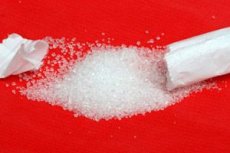
An effective remedy in the fight against colds is a dry cough mixture. Let's consider its features, dosage, side effects, and method of application.
The pharmaceutical market offers many drugs to combat ARVI, ARI and other cold-related pathologies. They all differ in their mechanism of action on the body, side effects and contraindications.
Dry cough mixture is a multi-component medicine, usually of plant origin. It has pronounced expectorant, anti-inflammatory and antitussive properties. Today, such drugs are used in many countries around the world, as they have a number of advantages compared to other medications:
- Safe to use for both pediatric and adult patients.
- Minimal risk of developing allergic reactions due to natural composition.
- Possibility of use for treating infants.
- Highly effective (cough goes away within 5-7 days).
- Complex effect on the body.
- Affordable price.
The medicine is a water-soluble powder for the preparation of an oral solution for oral administration. Its action is aimed at stopping cough, thinning sputum and improving the secretomotor functions of the body. Stimulates the activity of the bronchial glands, stops the inflammatory process in bronchitis, laryngitis, pneumonia and other diseases.
Indications dry cough mixture
Powder for the preparation of a solution for the treatment of cough and other colds is preferably used as part of a complex therapy. Indications for the use of dry antitussive mixture are based on the effectiveness of its components. It is recommended for the following diseases:
- Chronic obstructive pulmonary diseases.
- Laryngitis.
- Pharyngitis.
- Bronchial asthma.
- Pneumonia.
- Tracheitis.
- Pulmonary tuberculosis.
- Mucoviscillosis.
- Acute and chronic bronchitis.
The above mentioned diseases are accompanied by severe and painful coughing fits. The mixture helps to remove phlegm from the lungs, preventing the development of pathogenic microorganisms.
Even a single dose of the medicine improves the condition of the bronchi and relieves painful spasms. A lasting therapeutic effect develops within 5-7 days in combination with other medicines. But in some cases, the mixture is prescribed as an independent pharmaceutical product.
Dry cough mixture for what kind of cough?
When treating colds in both adults and children, doctors give preference to drugs with a combined effect. Dry cough mixture is one of these. What kind of cough does it help with and how to take it, let's consider these questions in more detail.
- The drug is most effective for coughs with bronchial mucus, i.e. sputum that is difficult to separate. Most often, the mixture is prescribed for bronchitis, tracheitis, bronchopneumonia, laryngitis.
- The combined herbal composition provides a mucolytic (expectorant) effect, relieves inflammation in the respiratory tract and has secretomotor properties.
The cough suppressant effectively fights colds at their initial stage. Most often it is used in combination with other anti-flu drugs, but if necessary it can be prescribed as monotherapy.
Release form
Dry cough mixture is a powdery product of non-uniform consistency and brownish-gray color, intended for dilution with water and oral administration. This form of release allows the drug to be used for patients of all ages, including small children.
The medicine is available in single-use sachets and small glass/plastic jars of 100 and 200 ml. The herbal cough suppressant has a specific aroma – a mixture of the smells of the main components.
Dry cough mixture in sachets
Dry cough mixture in sachets is perfect for effective and fast treatment of colds. This form of release significantly simplifies the process of using the medicine. It is enough to dissolve the contents of the package in a tablespoon (15 ml) of warm water and drink.
Many manufacturers add natural flavors and sweeteners to the drug. This makes it not only effective, but also pleasant to the taste, which is especially important when treating small children. Since babies react especially sharply to bitter or unpleasant-smelling medications.
 [ 4 ]
[ 4 ]
Composition of dry cough mixture
The dry cough mixture contains mainly herbal components. This allows it to be safely used to treat pediatric patients. Many pharmaceutical manufacturers produce medicine with the following ingredients:
- Dry extract of marshmallow root - contains mucous substances, pectin and starch, which envelop the irritated mucous membrane of the respiratory tract. It also contains carotene, asparagine, betaine, lecithin and other useful components. This provides an expectorant, anti-inflammatory, softening and enveloping effect. Marshmallow promotes rapid regeneration of damaged tissues.
- Dry extract of licorice root - relieves inflammation and has an anti-allergic effect. Contains flavonoids, ascorbic acid, coumarins. And also saponins, the main ones being glycyrrhizin and glycyrrhizic acid. They have foaming properties, due to which the secretory function of the mucous membrane of the respiratory tract increases and phlegm is liquefied. This facilitates the discharge of bronchial secretions, disinfects and has an anti-inflammatory effect.
- Anise oil is a substance with anti-inflammatory, antiseptic and antispasmodic properties. Reduces swelling of the mucous membrane of the respiratory tract, promotes effective resorption of sputum.
- Sodium bicarbonate – its action is aimed at increasing the effectiveness of licorice root and marshmallow. It helps to liquefy bronchial mucus and facilitates its removal from the body.
- Ammonium chloride – increases the contractility of the bronchi and the functioning of the ciliated epithelium. Stimulates the glands of the respiratory tract mucosa, promoting the secretion of sputum.
In addition to the above components, the mixture may contain auxiliary substances: ascorbic acid, sugar, sodium benzoate and others.
Names
Today, the pharmaceutical market offers a variety of drugs with antitussive activity. Let's look at the names and principle of action of medications in the form of a dry mixture (powder or granules for preparing a solution for oral use):
Milistan
Mucolytic agent - Milistan hot tea for cough, used for colds. Contains the active component - ambroxol, a metabolite of bromhexine. Normalizes the impaired secretion of cells of the glands of the bronchial mucosa, helps to liquefy viscous bronchial secretions and facilitates their removal. Vitamin C has an antioxidant and immunostimulating effect.
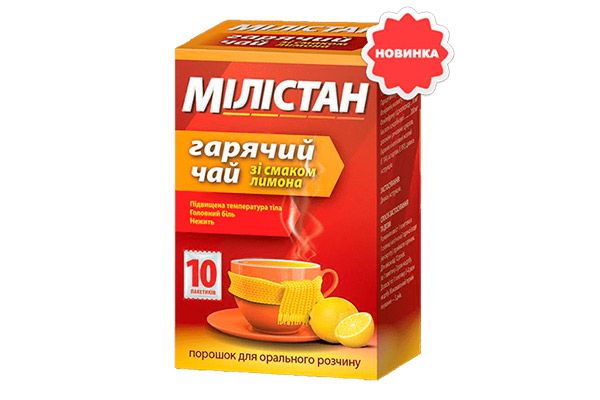
Stimulates the work of the ciliated epithelium of the bronchi, restores the drainage function of the bronchioles and small bronchi. Stimulates the formation of endogenous surfactant, reduces spastic hyperreactivity of the bronchi. Long-term use of the drug eliminates cough and reduces the volume of sputum secreted.
- Indications for use: acute and chronic respiratory diseases with cough and sputum, chronic bronchitis, pneumonia, cystic fibrosis, shock lung syndrome, bronchial asthma, bronchiectasis, condition after trachyostomy or bronchoscopy. The drug is effective in inflammatory lesions of the middle ear and paranasal sinuses.
- Method of use and dosage: for adult patients, 1 sachet 3-4 times a day; for children over 10 years old, ½ sachet 3-4 times a day. The contents of one sachet should be dissolved in a cup of hot water. The course of treatment lasts 7-10 days.
- Side effects: skin allergic reactions, increased weakness, epigastric pain, nausea, vomiting, diarrhea, headaches and dizziness, increased heart rate, heartburn. In case of overdose, symptoms of nausea and vomiting are observed, treatment is symptomatic.
- Contraindications: individual intolerance to the components of the product, diabetes mellitus, ulcerative lesion of the stomach or duodenum, first trimester of pregnancy and lactation, tendency to form blood clots, patients under 10 years of age.
The drug is available in powder form for the preparation of a solution for internal use. Milistan is a granulated mixture with the smell and taste of lemon.
Fluifort
A mucolytic and expectorant with the active component - carbocysteine. Its mechanism of action is based on the activation of sialic transferase - an enzyme of goblet cells in the bronchial mucosa. Normalizes the balance of neutral and acidic sialomucins of bronchial secretions. Restores the viscosity and elasticity of bronchial mucus. Improves regenerative processes, normalizes the structure of the mucous membrane and the functions of the ciliated epithelium.
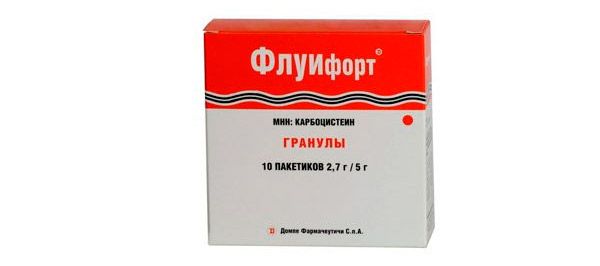
- Indications for use: acute and chronic bronchopulmonary diseases with the formation of difficult-to-separate viscous mucus. Used for bronchitis, tracheitis, bronchial asthma, tracheobronchitis, bronchiectatic pathology. Helps with acute and chronic diseases of the ENT organs: rhinitis, sinusitis, adenoiditis, otitis media. Can be used in preparation for such diagnostic procedures as bronchography and bronchoscopy.
- Method of application: the preparation is used to prepare an oral solution. The contents of one sachet should be dissolved in a glass of warm boiled water and drunk. The product is taken once a day. The duration of treatment is from 5 days to 6 months.
- Side effects: skin allergic reactions, headaches, dizziness, increased fatigue. Pain in the epigastric region, diarrhea, nausea, flatulence, vomiting. The above symptoms disappear after discontinuation of the drug. Overdose is manifested by increased side effects. There is no specific antidote, symptomatic therapy is indicated.
- Contraindications: hypersensitivity to Fluifort components, patients under 16 years of age, pregnancy (early stages) and lactation. With special caution it is prescribed for patients with diabetes mellitus, gastric ulcer or duodenal ulcer in the acute stage.
Fluifort is available in two forms: syrup in glass bottles of 100 ml and granules for oral solution of 5 g in a sachet.
Bronchofloxacin
A medicinal product from the pharmacological group of drugs for the treatment of cough and colds. The expectorant properties of the chest herbal tea are based on its secretolytic and secretokinetic action. The composition includes the following components: licorice root, black elder flowers, thyme herb, plantain leaves, peppermint.
Stimulates serous cells of the glands of the bronchial mucosa, increasing the amount of mucous secretion and reducing its viscosity. This facilitates expectoration of sputum, has a general strengthening and anti-inflammatory effect.
- Indications for use: complex treatment and prevention of acute and chronic inflammatory diseases of the respiratory tract with cough, formation of viscous sputum, bronchospasms. Inflammatory lesions of the rhinopharyngeal organs, i.e. laryngitis, pharyngitis, sinusitis and rhinitis.
- Method of administration and dosage: for adults and children over 15 years old, 1 sachet is prescribed 3-4 times a day. The contents of the package must be poured into a glass of warm water and drunk. The course of treatment depends on the severity of the painful symptoms, but usually takes no more than 1 month.
- Contraindications: hypersensitivity to the components, gastric ulcer and duodenal ulcer, patients under 15 years of age, pregnancy and breastfeeding, severe diseases of the cardiovascular system, kidneys and liver.
- Side effects: various allergic reactions, nausea, heart pain. If such symptoms appear, you should stop taking the medicine.
- Overdose: nausea and vomiting. Symptomatic and supportive therapy is indicated to eliminate them.
It is produced in the form of a sachet for making medicinal tea. The contents of the filter bag is a powdery mass of plant origin with a strong aromatic smell.
ACC
The drug contains acetylcysteine, an amino acid with mucolytic and expectorant properties. Reduces the viscosity of bronchial secretions, improves expectoration, and eliminates cough.

- Indications for use: bronchitis (acute, chronic, obstructive), tracheitis, bronchial asthma, laryngitis, sinusitis, otitis, cystic fibrosis and other diseases with accumulation of thick viscous sputum in the bronchial tree and upper respiratory tract.
- Directions for use: Dissolve the contents of the sachet in ½ glass of warm water and take 3-4 times a day after meals.
- Side effects: allergic reactions, headaches and dizziness, tinnitus, stomatitis, nausea, vomiting, diarrhea, heartburn, increased heart rate, arterial hypotension.
- Contraindications: hypersensitivity to active and auxiliary components, peptic ulcer, pulmonary hemorrhage and hemoptysis, pediatric practice, congenital fructose intolerance. With special caution it is prescribed during pregnancy and lactation.
- Overdose: various dyspeptic disorders. Treatment is symptomatic.
ACC is available in several forms: powder for the preparation of a solution for internal use, effervescent tablets and a hot drink.
Acysteine
Non-enzymatic mucolytic of direct action, precursor of glutathione and L-cysteine. Increases mucociliary clearance of mucous membranes, promotes adhesion of pathogenic microorganisms, preventing the formation and accumulation of toxins. Exhibits antioxidant and antitoxic activity.

- Indications for use: bronchitis, pulmonary emphysema, pneumonia, cystic fibrosis, tracheitis, laryngotracheitis, bronchiectasis, rhinosinusitis and other bronchopulmonary pathologies with increased viscosity of secretions and dry cough.
- Method of administration: granules for the preparation of a solution/syrup for patients aged 2-5 years are prescribed at 100 mg 2-3 times a day, for patients aged 6-14 years at 200 mg 2 times a day, for patients over 14 years at 200 mg 2-3 times a day. To prepare a solution, the contents of the sachet must be dissolved in a glass of warm water and stirred well.
- Side effects: gastrointestinal disorders, nausea, heartburn, vomiting, diarrhea, skin allergic reactions, headaches and stomatitis. No cases of overdose have been recorded.
- Contraindications: hypersensitivity to the components of the product, pregnancy and lactation, bronchial asthma, pulmonary hemorrhages, ulcerative lesions of the stomach and duodenum, renal failure.
Acysteine is available as a powder for oral solution and as granules for children's syrup, 200 mg each.
Fluimucil
A mucolytic agent with the ability to eliminate coughing fits, liquefy sputum, increase its volume and facilitate separation. Contains the active component - acetylcysteine. Stimulates the mucous cells of the bronchial tree, the secretion of which is lysed by fibrin. It also has antioxidant and anti-inflammatory properties.
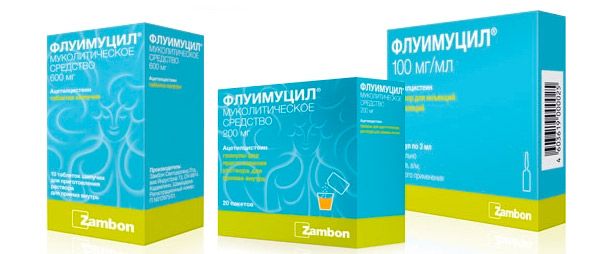
- Indications for use: respiratory diseases with impaired expectoration. The drug is effective in tracheitis, bronchitis, bronchiolitis, pneumonia, abscess and emphysema of the lungs, blockage of the bronchi with a mucous plug, interstitial lung diseases. Prescribed for purulent and catarrhal otitis, sinusitis and maxillary sinusitis to facilitate the discharge of secretions. Promotes the removal of viscous secretions in post-traumatic and postoperative conditions.
- Directions for use: dissolve granulated powder in 1/3 glass of water. For children aged 1-2 years, 100 mg 2 times a day, for children aged 2-6 years, 200 mg 2 times a day, for patients over 6 years, 200 mg 2-3 times a day. The duration of treatment is individual for each patient. In acute diseases, therapy lasts about 5-10 days, and in chronic diseases - several months.
- Side effects: nausea and vomiting, skin allergic reactions, tinnitus, nosebleeds, stomatitis, diarrhea. Overdose is manifested by nausea and vomiting, treatment is symptomatic.
- Contraindications: gastric ulcer and duodenal ulcer of the acute stage, intolerance to the components. It is prescribed with special caution during pregnancy and lactation, taking into account the possible risks for both the mother and the fetus.
Fluimucil is available in the form of granules for solution, effervescent tablets and injection solution.
Floursmith
An effective expectorant drug. Dilutes phlegm and increases its volume, reduces mucus viscosity. Stimulates mucous cells, accelerating the removal of phlegm from the body.
- Indications for use: acute and chronic bronchopulmonary diseases with viscous and thick sputum and severe cough. Bronchitis (acute, chronic, asthmatic), pneumonia, tuberculosis and pulmonary amyloidosis, tracheobronchitis, atelectasis due to bronchial obstruction with mucus, various post-traumatic and postoperative pulmonary complications.
- Method of administration and dosage: the drug is taken 3-4 times a day, dissolving the contents of the sachet in a glass of water. The course of treatment is individual for each patient.
- Side effects: nausea, vomiting, fever, feeling of tightness in the chest, skin allergic reactions, bronchospasms.
- Contraindications: hypersensitivity to active components. With special caution it is prescribed during pregnancy and lactation, for the treatment of pediatric patients.
If the drug is used for patients with broncho-obstructive syndrome, it should be combined with bronchodilators.
Muconex
A medicine used for coughs and colds. Belongs to the mucolytic pharmaceutical group. Contains the active ingredient acetylcysteine. Reduces the viscosity and viscous nature of the secretion that accumulates in the respiratory tract. Regulates lung function, facilitating breathing and expectoration.
- Indications for use: pathologies of the bronchopulmonary system in acute and chronic form, diseases with increased formation of sputum and deterioration of its expectoration.
- Contraindications: hypersensitivity to the components, gastric ulcer and duodenal ulcer in the acute stage, pulmonary hemorrhage, hemoptysis. It is prescribed with special caution to patients with kidney and liver diseases, as there is a risk of accumulation of nitrogen-containing substances in the body. It is not recommended for patients with hereditary fructose intolerance, as well as for pregnant and breastfeeding women, for children under 2 years of age.
- Method of administration and dosage: patients over 14 years of age take 400-600 mg of the drug per day, for patients aged 6-14 years 400 mg per day, for children aged 2-6 years 200-400 mg per day. The daily dosage should be divided into several doses. It is recommended to prepare the mixture 30 minutes before use. The dose prescribed by the doctor should be dissolved in a glass of warm water.
- Overdose: gastrointestinal disorders, nausea, vomiting, diarrhea. Treatment is symptomatic.
- Side effects: various allergic reactions (itching, urticaria, rash), shortness of breath, rhinorrhea, decreased platelet aggregation, hemorrhage, decreased blood pressure. Attacks of nausea and vomiting, bad breath, stomatitis, abdominal pain, heartburn, headaches and tinnitus are also possible.
Mukonex is available in the form of granules for the preparation of a mixture in bottles of 40 g (100 ml) and 60 g (150 ml).
Mukobene
A mucolytic agent, it liquefies sputum and increases its volume, which facilitates its rapid separation during a dry cough. It remains active against purulent sputum. It does not affect the immune system. It has an antioxidant and anti-inflammatory effect.
- Indications for use: severe cough with impaired expectoration. Prescribed for bronchitis, tracheitis, pneumonia, abscesses and emphysema of the lungs, bronchial asthma. Can be used in preparation for bronchoscopy, bronchography or aspiration drainage.
- Method of administration and dosage: orally 200 mg 2-3 times a day for adults, 100 mg 3 times a day for children 2-6 years old, 100 mg twice a day for patients under 2 years old. The duration of therapy is individual for each patient, therefore it is determined by the attending physician.
- Contraindications: intolerance to active components, pregnancy and lactation, arterial hypertension, varicose veins of the esophagus, hemoptysis, pulmonary hemorrhage, gastric ulcer and duodenal ulcer, phenylketonuria.
- Side effects: nausea, vomiting, nosebleeds, tinnitus, various skin allergic reactions. Increased drowsiness, fever and stomatitis are also observed. Symptomatic therapy is indicated to eliminate the above symptoms. Overdose is manifested by more pronounced side effects. There is no specific antidote.
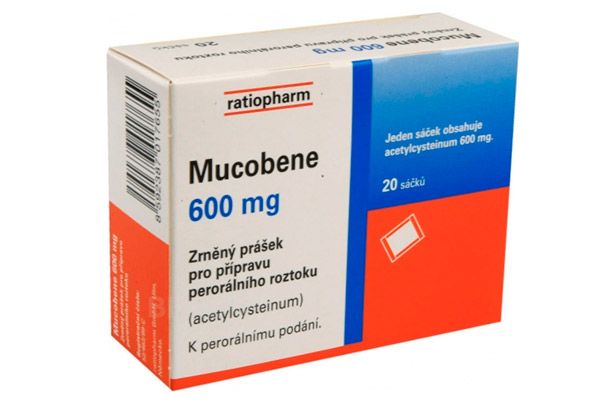
Mukobene is available in several forms: granules for oral solution, tablets, and injections for intramuscular administration. If the drug is prescribed for patients with diabetes, it should be taken into account that the granulate contains sucrose. Patients with broncho-obstructive syndrome need to combine the drug with bronchodilators.
N-AC-ratiopharm
Powder for preparation of solution for oral administration. Contains the active component - acetylcysteine. Has expectorant properties. Promotes liquefaction and easy removal of sputum, eliminates severe coughing fits. The therapeutic effect is observed 30-90 minutes after taking the medication and lasts for 2-4 hours.
- Indications for use: respiratory diseases with cough and formation of viscous, difficult to separate mucopurulent sputum. Prescribed for pneumonia, acute and chronic bronchitis, tracheitis, bronchiolitis, cystic fibrosis. The product is effective for atelectasis due to blockage of the bronchi with a mucous plug. It also facilitates the secretion and discharge of mucus in sinusitis.
- Method of administration and dosage: dissolve the powder in a glass of water and take after meals. For adults and children over 14 years old, 600 mg is prescribed divided into 2-3 doses per day. The duration of therapy depends on the characteristics of the disease and can last several months.
- Contraindications: hypersensitivity to acetylcysteine or other components of the drug, gastric ulcer and duodenal ulcer in the acute phase, children and adolescents, phenylketonuria. It is prescribed with special caution during pregnancy and lactation, with bronchial asthma, kidney disease, adrenal glands and liver, varicose veins of the esophagus and a tendency to pulmonary hemorrhage.
- Side effects: nausea, heartburn, vomiting, feeling of fullness in the stomach, skin allergic reactions, nosebleeds, fever, tinnitus. Treatment is symptomatic. It is also necessary to consult a doctor to adjust the dose or choose a safer analogue.
- Overdose: nausea, vomiting, diarrhea, allergic reactions. Treatment is symptomatic.
N-AC-ratiopharm is available in the form of dry powder for the preparation of a mixture/solution for oral administration. It is available in sachets of 3 g of the drug each.
In addition to the above-mentioned drugs, ready-made mixtures and effervescent tablets can be used to eliminate cough: Broncholitin, Lazolvan, Sinekod, Codelac Broncho, Vist Active Expectomed, Acestin, Exomyuk and others.
Dry cough mixture vifitech
A fairly popular combination product with expectorant and anti-inflammatory properties is a dry cough mixture. Vifitech is a pharmaceutical company that produces these powdered preparations and a number of other medications.
The medicine is available in single-use sachets. One package contains the following active ingredients:
- Dry extract of licorice roots 150 mg – has anti-inflammatory and antispasmodic properties, accelerates the removal of phlegm from the respiratory tract.
- Dry extract of thermopsis 45 mg – increases the secretion of bronchial glands.
- Sodium bicarbonate (baking soda) 300 mg – shifts the acidity level of bronchial mucus to the alkaline side, which helps reduce the viscosity of sputum.
- Anise oil 3.7 mg.
The drug is used as an expectorant for respiratory system disorders with cough and difficulty in expectorating sputum. It is most often prescribed for bronchitis, tracheitis and bronchopneumonia.
To prepare the solution, dissolve the contents of the packet in a tablespoon of boiled water at room temperature. It is recommended to take the product 3-4 times a day. Failure to comply with the dosage may cause side effects - allergic reactions, nausea and vomiting, diarrhea, gastritis.
The antitussive from Vifitech is contraindicated in case of hypersensitivity to its components, acute pyelonephritis and glomerulonephritis. The medicine is not recommended to be taken simultaneously with other medications with a similar mechanism of action, as well as with drugs that reduce the formation of sputum.
 [ 13 ]
[ 13 ]
Dry cough mixture mosfarma
Another oral medicine for the treatment of colds in children and adults is the dry cough mixture mosfarma. In its composition, the drug of this pharmacological manufacturer is practically no different from the antitussive from Vifitech. The composition of the drug from Mosfarma includes the following components:
- Marshmallow root extract.
- Licorice extract.
- Sodium benzoate and bicarbonate.
- Ammonium chloride.
- Anise oil.
- Sucrose.
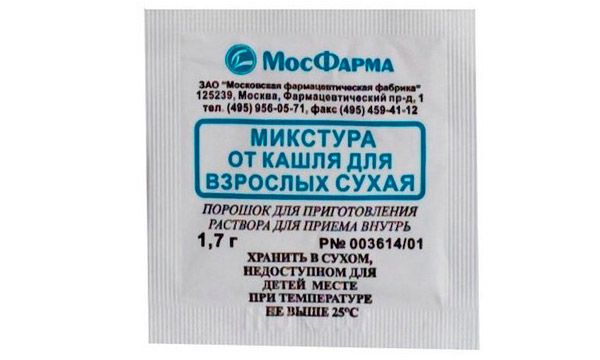
The combined herbal composition has an expectorant, anti-inflammatory and antitussive effect. Reduces the viscosity of sputum and promotes its removal from the body. Before using the mixture, you should pay attention to the presence of such contraindications: intolerance to active components, acute pyelonephritis or glomerulonephritis, pregnancy and lactation, fructose intolerance, glucose-galactose malabsorption, sucrase deficiency in the body.
It is prescribed for the treatment and prevention of respiratory diseases that are accompanied by a cough with difficult-to-separate sputum (bronchitis, tracheitis, bronchopneumonia). The course of treatment takes about a month. To prepare the solution, dissolve the contents of one sachet in a tablespoon of warm water. The product is taken 3-4 times a day. Dosage for patients over 12 years old - 15 ml, 9-12 years - 10 ml, 5-8 years - 5 ml, 3-4 years - 2.5 ml, for children under 1 year - 10-20 drops.
If the dosage prescribed by the doctor is not followed, side effects may develop. Most often, patients complain of nausea and vomiting, diarrhea, various allergic reactions, ulceration of the gastric mucosa. Symptomatic and supportive therapy is indicated to eliminate them. Despite the fact that the drug is sold in pharmacies without a prescription, you should consult a doctor before using it.
Althea dry cough syrup
An effective herbal medicine from the pharmaceutical company Althea is a dry cough mixture. It belongs to the category of expectorants. Contains the following components:
- Amino acids.
- Pectin substances.
- Organic acids.
- Fixed oils.
- Provitamin A.
- Phytosterols.
- Mineral salts.
The mechanism of action of the mixture is based on reflex stimulation of the respiratory, vomiting and cough centers of the medulla oblongata. Due to this, the peristalsis of the bronchioles is enhanced and the activity of the ciliated epithelium of the bronchi increases. The active substances stimulate the work of the bronchial glands, increase the volume of secreted sputum and reduce its viscosity. A local anti-inflammatory and counter-current effect is also observed.
The antitussive is prescribed for chronic and acute inflammatory lesions of the respiratory organs: bronchitis, tracheitis, pneumonia, pulmonary emphysema, bronchiectasis and other pathologies that require accelerated sputum discharge. The drug is prohibited for use in case of hypersensitivity to its active components, for pregnant women and patients with diabetes.
To prepare the solution, the contents of one packet of the drug should be dissolved in a tablespoon of boiled water at room temperature. The dosage depends on the patient's age and the severity of the pathological symptoms. The average duration of treatment is 7-14 days. In some cases, taking the drug causes side effects: allergic reactions, nausea, increased dry cough. In case of overdose, vomiting is possible, treatment is symptomatic.
 [ 16 ]
[ 16 ]
Arida dry cough mixture
To treat colds and their painful symptoms, many drugs of different forms are used. Arida dry cough mixture deserves special attention. It is a combined herbal remedy, which includes the following substances: marshmallow root, licorice root, anise oil, sodium bicarbonate, ammonium chloride and auxiliary components.
This drug belongs to the pharmacological group of secretomotor and expectorant agents. Its action facilitates the separation of sputum and stimulates expectoration.
- It is recommended for use as an anti-inflammatory, antitussive and expectorant agent for the complex treatment of inflammatory lesions of the respiratory tract in children and adults.
- The medicine is a powder with a distinct herbal odor. To prepare a solution, the dry contents should be diluted in boiled cooled water. The dosage and course of treatment depend on the patient's age. For children from one to six years old, 1 teaspoon is prescribed 4-5 times a day, for children over six years old, 1 dessert spoon 3-4 times a day, and for adults, 1 tablespoon 3 times a day.
- Arida is contraindicated in case of hypersensitivity to its components, organic lesions of the cardiovascular system, arterial hypertension, hypokalemia, renal and hepatic dysfunction. The use of the mixture during pregnancy and lactation is possible in the case when the expected benefit to the mother is higher than the potential risks to the child.
- In case of overdose and use of the drug for more than 2 months, a violation of water-electrolyte balance may develop. This entails myoglobinuria and hypokalemic myopathy. Side effects are manifested by skin allergic reactions, the formation of edema and increased blood pressure.
It is not recommended to use the antitussive agent with other agents with a similar mechanism of action, cardiac glycosides, laxatives and diuretics.
 [ 17 ]
[ 17 ]
Pharmacodynamics
Each medicine has a specific mechanism of action, pharmacological effects, strength and duration of action on the body. The pharmacodynamics of dry cough mixture is based on the ability to reduce the excitability of the cough center in the central nervous system, liquefy sputum and stimulate the activity of the bronchial glands. In addition, the active components have an anti-inflammatory and antispasmodic effect.
The cough mixture is especially effective for dry coughs with difficult to separate sputum. Due to its pharmacodynamics, the medicine is prescribed for chronic respiratory diseases. The herbal composition ensures minimal side effects and contraindications.
Pharmacokinetics
The dry mixture is intended for oral use. The pharmacokinetics of the drug is based on the activity of its components after entering the body. Plant substances have a moderate irritating effect on the receptors of the gastric mucosa. This causes excitation of the vomiting center of the medulla oblongata, a reflex increase in the secretion of the bronchial glands and suppression of cough.
Due to increased plasma transudation, mucus liquefaction occurs. And increased motor function of the bronchi improves the work of the villi of the ciliated epithelium. If the preparation contains essential oils, their action is aimed at increasing the secretion of the bronchial glands.
After oral administration, the mixture is quickly and well absorbed. It is metabolized mainly in the liver, forming active metabolites. The therapeutic effect lasts for 4-5 hours. The maximum concentration in the blood plasma is achieved in 1-3 hours. It is excreted by the kidneys and bile.
Dosing and administration
The method of application and dose of the mixture depend on the severity of the painful symptoms, the patient's age and the characteristics of his body. The medicinal powder is recommended in the following dosage:
- Infants (over 6 months) – 15-20 drops per dose.
- 1-2 years – 40 drops of mixture.
- 3-4 years – 60 drops.
- Children 5-7 years old – 1 teaspoon.
- Children 8-10 years old – two teaspoons at a time.
- Patients over 10 years old – one tablespoon per dose.
The dry substance is dissolved in boiled water and taken as prescribed by a doctor 3-6 times a day. The duration of treatment is from 1-2 weeks to several months.
How to dilute dry cough mixture?
To prepare a medicinal mixture, you need to know how to dilute a dry cough mixture. How to do this is described in the instructions for the drug:
- If the mixture is in a bottle, the container should be filled with warm boiled water to the mark indicated on the bottle. The resulting solution should be shaken thoroughly so that all medicinal components dissolve.
- The medicine in the sachet is intended for a single dose. To prepare the solution, the contents of the package must be dissolved in 15 ml of water (1 tablespoon). Patients over 12 years of age are prescribed the entire sachet, and for younger patients - the dose recommended by the doctor.
The multi-component product should be diluted with boiled but cooled to room temperature water. The frequency of taking the drug is determined by the attending physician. The finished mixture can be used within 48 hours from the moment of its preparation.
 [ 34 ], [ 35 ], [ 36 ], [ 37 ]
[ 34 ], [ 35 ], [ 36 ], [ 37 ]
Dry cough mixture for adults
A natural reflex of the body that occurs when an irritant enters the respiratory tract is a cough. Dry cough mixture for adults is prescribed for respiratory diseases. It minimizes coughing fits, helps to liquefy and remove viscous, difficult to separate mucopurulent sputum.
Most powdered preparations for oral solution contain herbal ingredients. Due to this, they are not only effective, but also safe for the body.
- Indications for use: pneumonia, acute and chronic bronchitis, bronchiolitis, tracheitis, cystic fibrosis, laryngitis, atelectasis due to blockage of the bronchi with a mucous plug. Facilitates secretion and discharge of mucus in sinusitis. Quickly clears the lungs and bronchi of pathogens in diseases of the upper and lower respiratory tract.
- Contraindications: risk of allergic reactions to herbal components of the drug, pregnancy and breastfeeding, pediatric patients. Fructose intolerance, acute pyelonephritis, glucose-galactose malabsorption, glomerulonephritis.
- The method of application and dosage are selected by the attending physician for each patient individually and depend on the severity of the painful symptoms. To prepare the solution, dissolve the contents of one packet in boiled water. The medicine is taken 4-6 times a day. The course of treatment takes about 2-3 weeks.
- Side effects: allergic reactions and signs of hypersensitivity to the components of the product. Skin rashes, itching, pain in the epigastric region, diarrhea.
The medicine is especially effective for dry, hacking coughs. The mixture moisturizes the mucous surface of the respiratory tract and liquefies bronchial secretions.
Dry cough mixture for children
Most often, colds are diagnosed in children. Due to a weak immune system, this age group is most susceptible to various types of viral and bacterial pathologies.
Dry cough mixture for children can be prescribed from the first days of the disease. The medicine has a combined composition of plant origin. It has expectorant, secretomotor, antispasmodic and anti-inflammatory properties. Promotes rapid expectoration of both dry and wet cough.
- Indications for use: bronchitis (acute, chronic, obstructive), pneumonia, laryngitis, bronchial asthma, tracheitis, pulmonary tuberculosis, adenovirus infection, influenza, pharyngitis, cystic fibrosis.
- Dosage and rules for preparing the solution: a single-dose sachet should be dissolved in warm boiled water and drunk. If the dry powder is in a bottle, then liquid should be added to it up to the 200 ml mark (indicated on the bottle) and shaken well so that all components are dissolved. The prepared solution is given to children 1 teaspoon 3-4 times a day. The course of treatment is determined by the doctor. In some cases, therapy can last for 2-3 weeks.
- Main contraindications: children under 6 months, individual intolerance to the components of the medication, acute pyelonephritis, acute glomerulonephritis. It is prescribed with special caution to children with diabetes. The mixture is not recommended to be taken simultaneously with other antitussives.
- Side effects: the drug is generally well tolerated. In rare cases, allergic reactions, itching, skin rash, painful sensations in the gastrointestinal tract, bowel disorders, nausea, vomiting are observed.
The drug can only be taken as prescribed by a doctor, with an individual dosage selected.
Dry cough mixture for infants
Cough in infants causes real panic in parents. And this is not surprising, since the physiological characteristics of newborns are manifested by immaturity of the respiratory muscles and frequent pathologies of cough drainage. For the treatment of colds, the safest drugs with minimal side effects and contraindications are used.
Dry cough mixture for infants is allowed only from the age of six months. The mucolytic and antitussive agent is selected by the doctor, individually for each baby. The severity of the disease and the characteristics of the child's body are taken into account. Children can be prescribed the following dry multicomponent agents: Fluifort, Bronchoflox, ACC, Acisteine, Mukomist.
In addition to dry mixtures for treating cough in infants, ready-made oral drops and solutions are also used: Ambroxol, Lazolvan, Ambrobene, Gedelix, Stoptussin. The entire treatment process is not limited to taking medications. For a speedy recovery, the child should be given plenty of fluids, and cool and humid air should be created in the room.
Use dry cough mixture during pregnancy
Coughing fits during pregnancy cause many problems. Reflex muscle spasms can lead to hypoxia, that is, insufficient supply of oxygen to the body's tissues. In rare cases, severe coughing provokes premature labor.
The use of dry cough mixture during pregnancy is possible only on doctor's prescription. This is due to the risk of developing side effects and the presence of certain contraindications to the components of the drug. Some antitussive drugs are prohibited in the first trimester.
The dry mixture is effective in combating both dry and wet productive cough. Herbal components eliminate bronchospasms and irritation of the mucous membrane. But such preparations can only be used after consulting a doctor.
Contraindications
Dry cough mixture, like any other medicine, has certain contraindications for use:
- Individual intolerance to the components of the medication.
- Pyelonephritis.
- Glomerulonephritis.
- Patients under 6 months of age.
The drug is prescribed with special caution to patients suffering from diabetes and those predisposed to allergic reactions.
Side effects dry cough mixture
A combination herbal remedy for cough, i.e. a dry mixture, can cause the following side effects:
- Nausea.
- Vomit.
- Various allergic reactions.
- Stool disorders (diarrhea).
- Hives.
- Skin itching and redness.
If the above symptoms develop, stop taking the drug. Symptomatic therapy is indicated for treatment. In particularly severe cases, it is necessary to wash the stomach and take enterosorbents. Enterosorbents neutralize the toxic effect of the mixture and remove it from the body.
Overdose
As a rule, dry cough mixture does not cause overdose symptoms. In rare cases, nausea and vomiting, convulsions, and pulmonary edema may occur. If the drug contains licorice root, then overdosing on this plant substance may cause the following symptoms: swelling of the extremities, arterial hypertension, and heart rhythm disturbances. Symptomatic treatment and further supportive therapy with drug withdrawal are indicated to eliminate them.
Interactions with other drugs
When treating colds in combination, all interactions with other medications should be carefully monitored. Dry cough mixture is not recommended to be taken simultaneously with other antitussives, as well as medications that reduce the formation of sputum.
It is necessary to take into account that the marshmallow root reduces the absorption of other drugs. Therefore, they should be taken an hour before or after the mixture. Licorice root disrupts the mechanism of action of antihypertensive drugs. When used simultaneously with cardiac glycosides, laxatives or antiarrhythmic drugs, hypokalemia may increase and severe ventricular tachycardia may develop.
 [ 41 ]
[ 41 ]
Storage conditions
According to the storage conditions, the dry cough mixture should be kept in the original packaging, in a dry, cool place, protected from sunlight and inaccessible to children. The storage temperature should be within +22-25° C.
The prepared solution from a single-use sachet should be used within 48 hours from the moment of preparation. The diluted mixture in the bottle can be stored for no more than 10 days. The storage temperature should be up to +15° C, and the medicine itself in a closed container.
Shelf life
Each medicine has a certain shelf life, during which its active components retain their pharmacotherapeutic properties. Cough mixture in the form of dry powder can be stored for 18 months from the date of manufacture (indicated on the package).
After this period, the drug is prohibited to take and must be disposed of. The use of expired medications, especially for the treatment of children, threatens serious uncontrolled side effects from many organs and systems.
Reviews
Numerous positive reviews of such a drug as dry cough mixture confirm its effectiveness. The drug is prescribed for various respiratory diseases, which are characterized by cough and increased secretion of bronchial mucus. The combined herbal base stimulates the drainage function of the bronchi, promotes the removal of phlegm.
The natural composition, pronounced antitussive and expectorant effect, allow the use of the medicine to treat pediatric patients. The mixture is prescribed to babies from six months of age. The medicine helps well with dry and wet cough and is quite easy to use. In addition, in terms of its price characteristics, the mixture is much more affordable than other drugs with a similar principle of action and even composition.
Effective and inexpensive mixtures for dry cough
An unpleasant and intrusive symptom with frequent attacks of exacerbation and sore throat is a dry cough. It is an inflammatory process in the active phase, but with the absence of sputum. In some patients, the cough most often makes itself known at night, while in others it lasts throughout the day.
There are several types of dry cough without phlegm:
- Muffled/dull – indicates tuberculosis or oncological processes in the body.
- Barking – occurs due to damage to the vocal cords during acute respiratory viral infections.
- Tearing - bronchitis, whooping cough, and also occurs in heavy smokers.
The appearance of a cough without the separation of bronchial mucus is most often observed in the following diseases: acute respiratory viral infections, flu, bronchitis, bronchial asthma, tracheitis, tracheobronchitis, pleurisy, pneumonia, pharyngitis, bronchopneumonia and others.
Various medications are used to treat the painful condition, but mixtures are considered to be especially effective. This medicine is a combination of various components. The mixture may consist of herbal components, alcohol tinctures, ingredients with anti-inflammatory and antiseptic properties. Another advantage of the mixture, regardless of its form (dry, ready-made solution), is that its active substances are quickly absorbed by the body, unlike tablets.
Today, the pharmaceutical market offers a variety of drugs with different forms of release and composition for the treatment of colds. Effective and inexpensive mixtures for dry cough are quite difficult to find, but they exist. Let's consider the most popular and at the same time effective medicines in the economy segment, the cost of which is less than 100 hryvnia:
- Dextromethorphan
A medicine used for coughs and colds. Its mechanism of action is based on the suppression of the cough center of the medulla oblongata. The drug suppresses coughs of any etiology, does not have an analgesic, narcotic or hypnotic effect. A persistent therapeutic effect develops 10-30 minutes after use and lasts for 5-6 hours.
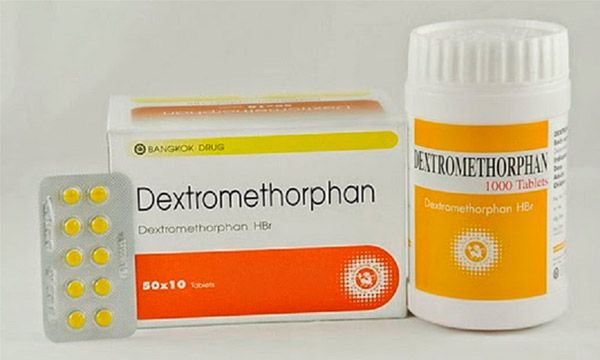
- Indications for use and dosage: dry cough of any origin. The remedy is prescribed for patients over 6 years old, 1 teaspoon of the mixture 3-4 times a day.
- Contraindications: intolerance to active components, bronchospasms, bronchitis, bronchial asthma, children under 6 years of age. With special caution it is prescribed in early pregnancy and in case of liver dysfunction.
- Side effects: nausea, vomiting, stomach pain, bowel disturbances, headaches and dizziness.
- Overdose: increased agitation, respiratory depression, nausea and vomiting, dizziness, impaired consciousness, tachycardia, muscle hypertonia, difficulty urinating. Treatment is symptomatic.
The drug is not recommended for use simultaneously with MAO inhibitors, Amiodarone or Fluoxetine.
Antitussive, expectorant and antispasmodic. It is used for upper respiratory tract diseases with severe dry cough and difficulty in expectorating sputum. Contains ivy leaf extract. The solution is taken 5 ml (1/2 measuring cup) 2-3 times a day. The course of treatment is 7-10 days. Gedelix is not prescribed for intolerance to its components. The product is available as a liquid mixture in 200, 100 and 50 ml bottles.
- Sinekod
A non-narcotic antitussive of direct action with a combined composition. Blocks the cough center in the medulla oblongata, but does not have a depressing effect on the respiratory center. Has bronchodilator and anti-inflammatory properties.
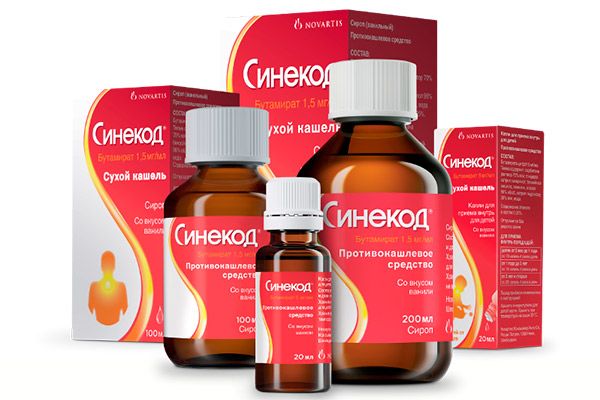
- Indications for use: debilitating unproductive dry cough of various etiologies, respiratory diseases.
- Directions for use: It is recommended to take the ready mixture before meals, dissolving it in a small amount of water. The dosage and course of treatment are selected by the doctor, individually for each patient. For children 3-12 years old, 5-10 ml of the drug is prescribed 2-3 times a day, for patients over 12 years old, 15 ml 3 times a day.
- Side effects: increased fatigue, headaches and dizziness, nausea, vomiting, bowel disorders, allergic skin reactions.
- Contraindications: hypersensitivity to the components of the drug, first trimester of pregnancy and lactation, patients under 3 years of age, pulmonary hemorrhage.
- Overdose: nausea, vomiting, bowel disorders, decreased blood pressure, loss of consciousness, headaches and dizziness. Gastric lavage and enterosorbents are indicated for treatment.
The mixture is available in bottles containing 200 ml of the drug each, as well as in the form of drops for oral administration.
- Lorraine
A combination drug for the relief of cold and acute respiratory infections. It has antipyretic, anti-flow and vasoconstrictive properties. It is available in the form of a dry powder for the preparation of a mixture for oral administration, as well as in the form of tablets and an oral suspension. The dosage is determined by the doctor for each patient individually.
The drug is contraindicated for patients under 6 years of age, during pregnancy and lactation. In case of blood diseases, renal and hepatic insufficiency, diabetes mellitus, bronchial asthma. In case of overdose, side effects may develop: nausea, pain in the epigastric region, anemia, allergic reactions. Symptomatic treatment: gastric lavage and intake of enterosorbents.
- Herbion
A medicinal product with mucolytic, bronchodilator and antispasmodic properties. Contains dry ivy leaf extract, triterpene saponins and other biologically active components.
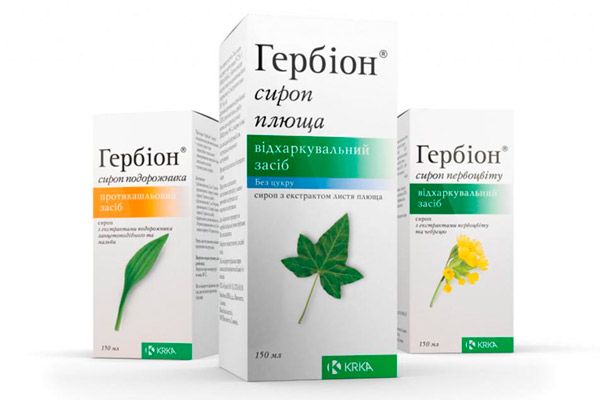
- Indications for use: acute inflammatory diseases of the lower and upper respiratory tract with dry cough. Can be used as symptomatic therapy for chronic inflammatory lesions of the bronchi.
- Method of administration: the medicine is taken orally. The dosage is prescribed by the attending physician individually for each patient. The required amount of mixture is measured using a dosing cap. The medicine is taken regardless of food intake. It is recommended to drink more liquid during therapy. The course of treatment should not exceed 1 week.
- Side effects: bowel disorders, nausea, vomiting, skin allergic reactions, swelling of the mucous membranes. There is no specific antidote, treatment is symptomatic.
- Contraindications: hypersensitivity to the components of the drug, fructose intolerance. It is prescribed with special caution during pregnancy and lactation.
- Overdose: nausea, vomiting, bowel disturbances.
Gerbion is available in liquid form in 150 ml bottles with a measuring spoon and cup.
- Bronchicum
Antitussive, mucolytic, anti-inflammatory and antispasmodic agent. Eliminates dry cough, effectively liquefies phlegm, reduces swelling of the bronchial mucosa.
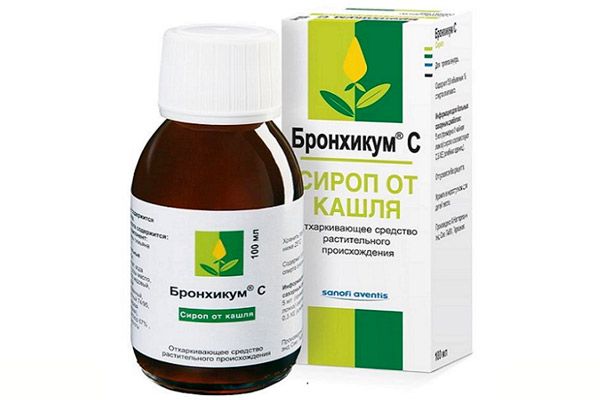
Indications for use: paroxysmal cough, acute and chronic diseases of the lower and upper respiratory tract. The mixture is prescribed to adults 1 teaspoon every 2-3 hours, and for children ½ teaspoon 2-3 times a day.
The drug is contraindicated in case of intolerance to its components. Side effects and symptoms of overdose are manifested by irritation of the gastric mucosa.
- StopTussin
A complex antitussive with mucolytic and expectorant action. Contains the active component - stopussin butamirate, which has local anesthetic properties in relation to bronchioles and bronchi, weakening cough.
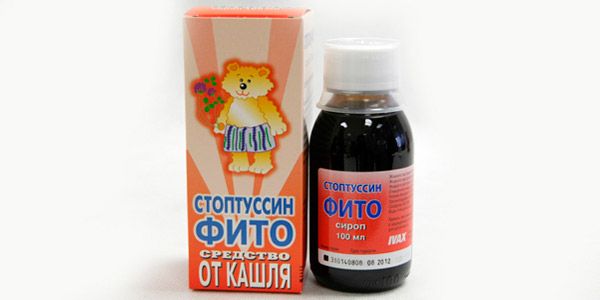
- Indications for use: painful conditions with dry, debilitating cough, infectious and inflammatory pathologies of the respiratory system, cough in bronchial asthma, pneumoconiosis. Dosage and course of treatment depend on the patient's age and severity of the disease.
- Side effects: headaches and dizziness, nausea, vomiting, bowel disorders, local allergic reactions and pain in the epigastric region.
- Contraindications: hypersensitivity to the components of the drug, first trimester of pregnancy and lactation.
- Overdose: nausea, vomiting, CNS depression. Treatment is based on gastric lavage, activated carbon and other symptomatic therapy. There is no specific antidote.
The medicine is available in the form of a ready-made liquid mixture in 10 and 25 ml bottles.
- Ambrobene
A mucolytic drug that stimulates prenatal lung development. It has secretomotor, expectorant and secretolytic properties. Increases the motor activity of the cilia of the ciliated epithelium, improves mucociliary transport of sputum.
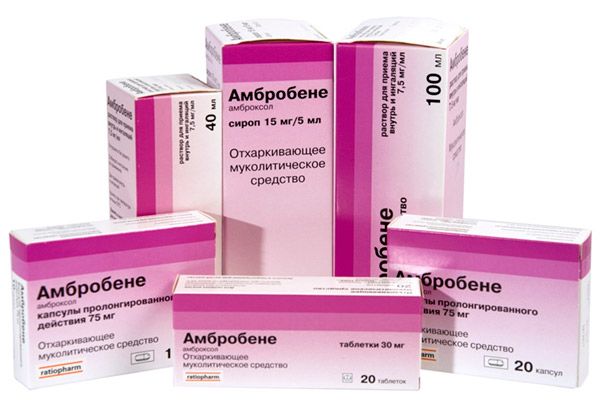
- Indications for use: respiratory diseases with viscous sputum, severe dry cough in acute or chronic bronchitis, pneumonia, bronchial asthma. The mixture is taken 10 ml 3 times a day. The duration of treatment is determined by the attending physician, individually for each patient.
- Side effects: skin allergic reactions, increased weakness, headaches, bowel disorders, dry mouth and respiratory tract, nausea and vomiting. Overdose is manifested by increased side effects, treatment is symptomatic.
- Contraindications: hypersensitivity to the components of the drug, first trimester of pregnancy, ulcerative lesions of the stomach and duodenum, lactation.
Dry cough mixture should be used only as prescribed by a doctor. The doctor determines the dosage, duration of treatment and other features of the drug.
Attention!
To simplify the perception of information, this instruction for use of the drug "Dry cough mixture for children and adults, in pregnancy: how to dilute and take" translated and presented in a special form on the basis of the official instructions for medical use of the drug. Before use read the annotation that came directly to medicines.
Description provided for informational purposes and is not a guide to self-healing. The need for this drug, the purpose of the treatment regimen, methods and dose of the drug is determined solely by the attending physician. Self-medication is dangerous for your health.

